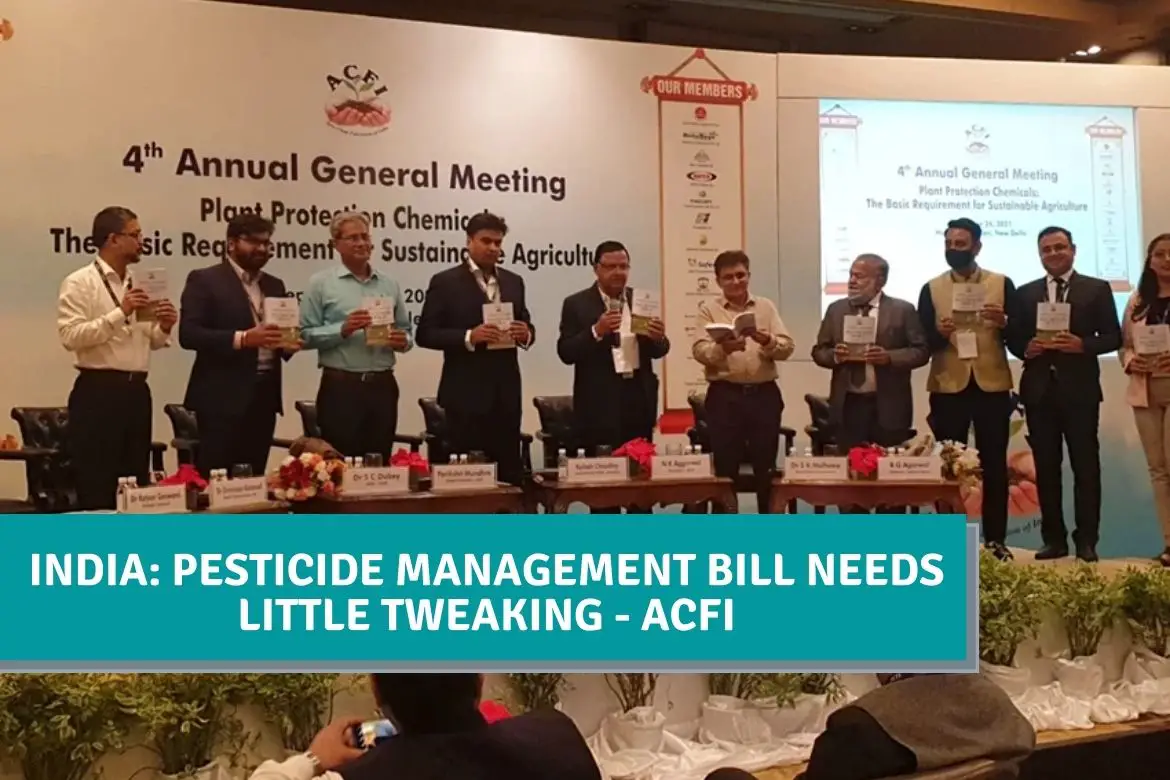Regulatory Data Protection is one of the top concerns of the agrochemical industry, according to ACFI. However, it has not been included in PMB 2020
An association of the agrochemical industry, Agro Chem Federation of India (ACFI), held a brainstorming discussion on the topic, Plant Protection Chemicals, at the 4th general annual meeting. The meeting had “The basic requirement for Sustainable Agriculture” as its main agenda of discussion. An important part of the discussion explained the need to educate farmers about the proper use of plant protection chemicals (pesticides) and how the agrochemical industry needs to work together on perception management.
Dr. SK Malhotra, Agriculture Commissioner and Chairman, Registration Committee, Ministry of Agriculture and Farmers Welfare, stated that, “the government is working towards Central Insecticides Board & Registration Committee (CIBRC) reforms and ease of doing registration.” Additionally, he expressed concern about the unorganized pesticide industry and said he hoped it would be more organized.
At the event, Dr. SC Dubey, Assistant Director General of the Indian Council of Agricultural Research (ICAR), discussed the importance of indigenous molecules, the setting up of R&D, and data protection to encourage the development of new technologies.

Outgoing ACFI President, NK Aggarwal, welcomed all members to the AGM and expressed his gratitude towards all the members thanking them for their support. Furthermore, he expressed pleasure on how ACFI has gradually emerged as a true platform for policy intervention and a voice for the entire Indian agrochemical industry in an open and democratic manner.
A modification of the Pesticide Management Bill is also needed to simplify the registration process and support uncomplicated registration, he urged. In addition, he emphasized the need for skill development among farmers, dealers, and distributors.
On March 23, 2020, Narendra Singh Tomar, Minister of Agriculture and Farmers Welfare, introduced the Pesticide Management Bill (PMB) – 2020 in the Rajya Sabha. On June 3, 2021, it was referred to the Standing Committee.
Pesticide Management Bill recommendations from ACFI
A registration deadline is not specified in the 2020 Bill. The Registration Committee will have the ability to function more transparently and efficiently if the registration is granted within one year of the application.
The PMB-2020 report fails to mention the “serious problems” of thousands of ghost registrations and hundreds of licenses, farmer complaints about pesticide quality, and lax quality control enforcement.
The bill does not address India’s need for better and newer molecules.
The agrochemical industry is concerned about regulatory data protection. PMB 2020 does not include it. To register a new pesticide, the applicant must submit safety and efficacy data obtained over several years. Data protection will ensure that no other person can be registered with the same pesticide based on the data generated. In order to be a global hub for agrochemicals, India must offer an internationally acceptable and favourable business environment, which will encourage molecule discoverers to bring the best molecules to Indian farmers and eventually manufacture them here.
More stringent penalties and punishments alone would guarantee quality products, according to PMB-2020. It should, instead, ensure that only responsible persons can obtain registrations and secure manufacturing licenses so only real products can be distributed to the farmers. The existing law and the proposal both do not place any qualification requirements on obtaining a registration, making it extremely easy for people to obtain a manufacturing license. Over 4,000 companies have received over 150,000 registrations, which is evidence of this.
Moreover, the PMB-2020 bill should specify clearly the minimum standards requirements for the Central Insecticides Laboratory and the State Pesticides Testing Laboratories. This will improve quality enforcement.

